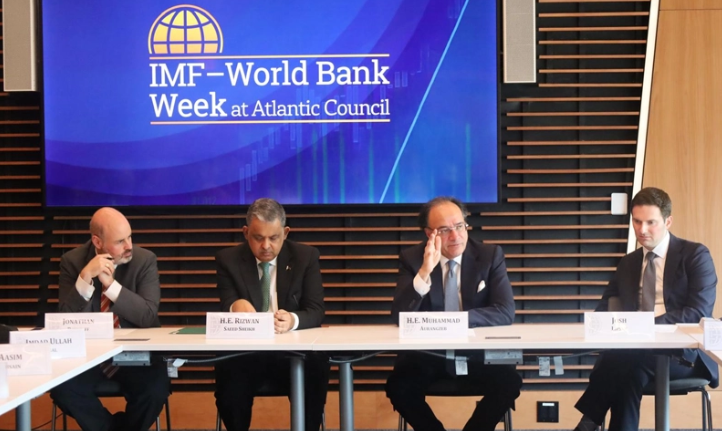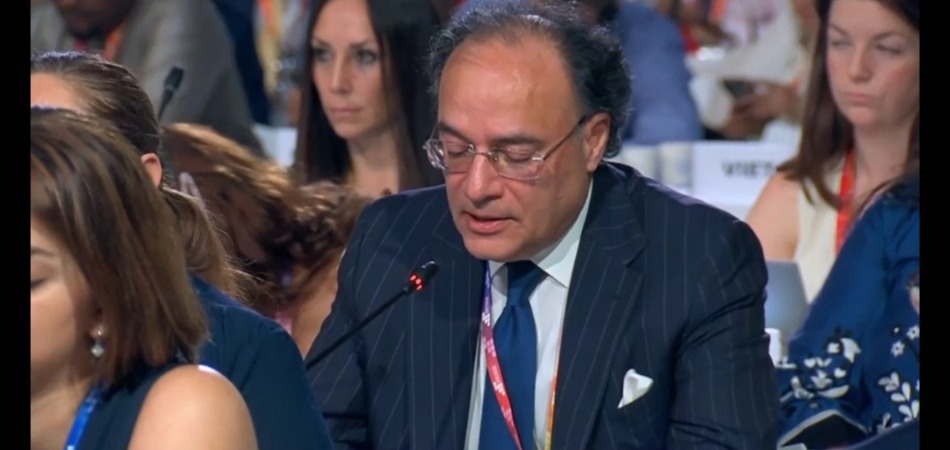FinMin shares tax growth outlook at Atlantic Council talk

By MG News | April 23, 2025 at 09:36 AM GMT+05:00
April 23, 2025 (MLN): Pakistan’s tax-to-GDP ratio is expected to reach 10.6% by the end of the fiscal year, with a 29% increase in tax revenues recorded the previous year.
This was noted by the Federal Minister for Finance and Revenue, Senator Muhammad Aurangzeb, during a wide-ranging conversation at the Atlantic Council’s GeoEconomics Center.
The discussion, themed “Challenges and Opportunities for the Pakistani Economy through 2025 and Beyond,” was held on the sidelines of the IMF-World Bank Spring Meetings in Washington, D.C.
In a candid discussion, the Minister shared the Government of Pakistan’s current macroeconomic outlook, reform agenda, and strategic priorities, highlighting critical efforts to foster long-term economic resilience and engage constructively with international financial institutions.
Reflecting on the progress made since his last appearance at the Council a year ago, he noted that Pakistan has made significant strides in stabilizing its macroeconomic fundamentals.
He pointed to a rising foreign exchange reserve position, easing inflation, an improved credit rating, and an improving fiscal balance as key indicators of progress, according to the press release.
Aurangzeb emphasized that while these developments are encouraging, macroeconomic stability is not the end goal but a prerequisite for sustainable growth and reform.
Using a cricket analogy, he remarked that Pakistan now has “some runs on the scoreboard,” but must avoid falling into past cycles of boom and bust.
On the fiscal front, he acknowledged the delicate balance required to instill fiscal discipline while creating room for social and development spending.
The government’s strategy includes active debt management—yielding nearly a trillion rupees in debt servicing savings and leveraging falling policy rates to create fiscal space.
He further discussed the ongoing efforts to rationalize federal expenditures and collaborate with provincial governments through the National Fiscal Pact, particularly in aligning responsibilities for social sector spending and enabling provincial contributions to revenue, including the introduction of agricultural income tax a historic first in Pakistan.
Addressing concerns regarding the effectiveness of revenue reforms, the Minister underscored the importance of enforcement and digitalization.
Pakistan's large informal economy and the substantial cash in circulation—amounting to nine trillion rupees pose a serious challenge.
He stressed the importance of formalizing sectors like retail, real estate, agriculture, and wholesale, and highlighted the role of end-to-end digital solutions, including AI-driven audits, track and trace systems, and faceless customs in plugging leakages and boosting compliance.
He reiterated the need to rebuild public trust in the Federal Board of Revenue (FBR), calling for reform across people, processes, and technology.
Turning to demographic challenges, the Minister identified population growth and climate change as existential issues requiring immediate and coordinated action.
He detailed the government’s efforts to work with provinces to develop a comprehensive strategy for family planning, maternal health, and education especially girls’ education.
He stressed the link between family planning and child stunting, noting that nearly 40% of Pakistani children under five suffer from stunting, which in turn has long-term implications for human capital development.
The focus, he said, is not merely on identifying the issues, which are well known, but on implementing practical, locally-relevant solutions learning from successful models like Bangladesh.
On climate resilience, Senator Aurangzeb reiterated the importance of attracting private sector investment and building bankable, investable projects that meet international reporting and transparency standards.
He cited several recent initiatives, including the Asian Development Bank’s $500 million commitment, a substantial climate component under the World Bank’s ten-year Country Partnership Framework, and the recently concluded $1.3 billion Resilience and Sustainability Facility (RSF) with the IMF.
The Minister also confirmed that Pakistan is finalizing a green taxonomy framework through the State Bank, paving the way for innovative instruments such as green bonds, green sukuks, and the country’s inaugural Panda bond, with proceeds linked to SDG-aligned projects.
In the broader global context, he spoke on the need to reform Bretton Woods institutions to better serve countries facing complex challenges.
He expressed appreciation for the progressive and introspective leadership currently at the helm of the IMF and the World Bank, noting efforts to streamline operations across public and private sector arms, reduce commitment fees, and enhance collaboration among multilaterals.
Senator Aurangzeb called for the establishment of a global platform to jointly manage concessional finance flows and stressed the importance of institutional accountability, both domestically and internationally.
He concluded by reaffirming Pakistan’s commitment to reform, execution, and partnership with global institutions for a resilient and inclusive economic future.
Copyright Mettis Link News
Related News
| Name | Price/Vol | %Chg/NChg |
|---|---|---|
| KSE100 | 130,388.80 290.67M |
1.71% 2189.37 |
| ALLSHR | 81,056.77 850.76M |
1.59% 1269.14 |
| KSE30 | 39,923.98 119.80M |
2.09% 818.98 |
| KMI30 | 189,431.05 124.20M |
1.35% 2515.44 |
| KMIALLSHR | 54,746.96 413.87M |
1.01% 545.08 |
| BKTi | 35,055.16 46.98M |
4.72% 1578.48 |
| OGTi | 28,239.18 11.25M |
0.99% 276.60 |
| Symbol | Bid/Ask | High/Low |
|---|
| Name | Last | High/Low | Chg/%Chg |
|---|---|---|---|
| BITCOIN FUTURES | 108,230.00 | 108,340.00 105,440.00 |
2480.00 2.35% |
| BRENT CRUDE | 67.50 | 67.53 66.94 |
0.39 0.58% |
| RICHARDS BAY COAL MONTHLY | 97.50 | 0.00 0.00 |
0.75 0.78% |
| ROTTERDAM COAL MONTHLY | 103.80 | 0.00 0.00 |
-3.70 -3.44% |
| USD RBD PALM OLEIN | 998.50 | 998.50 998.50 |
0.00 0.00% |
| CRUDE OIL - WTI | 65.81 | 65.83 65.23 |
0.36 0.55% |
| SUGAR #11 WORLD | 15.93 | 15.95 15.77 |
0.23 1.47% |
Chart of the Day
Latest News
Top 5 things to watch in this week
Pakistan Stock Movers
| Name | Last | Chg/%Chg |
|---|
| Name | Last | Chg/%Chg |
|---|




 CPI
CPI